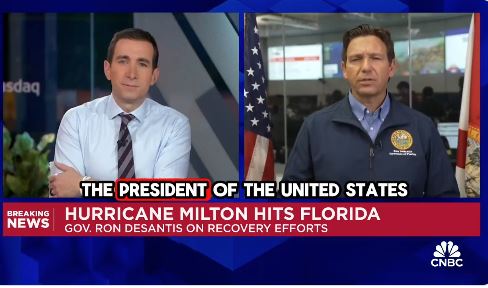Florida Governor Ron DeSantis recently appeared on CNBC shortly after Hurricane Milton struck near Tampa as a Category 3 storm. With the state grappling with the repercussions of two significant hurricanes, the interview quickly took a contentious turn when host Andrew Ross Sorkin attempted to cast blame on DeSantis for not responding to a call from Vice President Kamala Harris. Sorkin’s implication suggested that DeSantis was politicizing the disaster by overlooking the Vice President’s outreach. However, DeSantis firmly rejected this narrative, emphasizing the longstanding challenges he has faced while managing natural disasters in Florida under both the Trump and Biden administrations.
In his defense, DeSantis stated that he was unaware of Harris attempting to contact him, underscoring that her involvement in the disaster response process was unwarranted. He framed Harris’s actions as political opportunism rather than a genuine response to the needs arising from the hurricane. The governor characterized her efforts as an attempt to insert herself into the situation for her political campaign, indicating that he was focused on the immediate needs of Florida and had little time for what he perceived as “games” from Harris’s side. His leadership during these trying times was underscored by a commitment to prioritizing the state’s needs above political maneuvering.
DeSantis dismissed the Vice President’s contribution, suggesting that she lacked a true understanding of disaster response. He contrasted his hands-on approach to crisis management with what he viewed as Harris’s superficial engagement. His remarks significantly highlighted the national divide in leadership styles, emphasizing a commitment to action and steady guidance during crises. Throughout his handling of the situation, DeSantis articulated a clear stance that disaster management should remain apolitical and focused on helping affected citizens rather than being influenced by political pressures or personal agendas.
The backdrop of Hurricane Milton—a fresh reminder of the frequent disasters that affect Florida—serves as a critical point in understanding the governor’s perspective. DeSantis is not new to the complexities of emergency management; he has faced similar challenges in the past, working to coordinate resources, provide support for citizens, and address the aftermath of hurricanes. His comment that neither Trump nor Biden had politicized past storms underscores a stark contrast to what he accused Harris of attempting to do now. This comparison not only reiterates his experience but also strengthens his argument against politicization in disaster response.
Moreover, social media reactions to the interview further body this divide between leadership styles. While pictures circulated highlighting DeSantis actively preparing for the arrival of Hurricane Milton, contrastingly, images appeared depicting Harris engaging in lighter activities, such as drinking beer with Stephen Colbert. Such visual imagery fueled a narrative that framed DeSantis as a dedicated leader while painting Harris as out of touch with the serious nature of the situation unfolding in Florida. These portrayals resonated with many observers who felt that a leader’s priorities should reflect the gravity of the circumstances surrounding them, thereby reinforcing DeSantis’s stance.
In conclusion, the heated exchange between DeSantis and Sorkin, as well as the broader political implications surrounding disaster response, reflects the ongoing tensions in U.S. political discourse. As DeSantis continued to grapple with the immediate aftermath of Hurricane Milton, his commitment to the people of Florida and desire to keep politics out of the crisis were evident in his dialogue. The incident serves as a reminder of the varying approaches to leadership during crises and the potential implications that political narratives can have on public perception and response strategies in times of uncertainty.

